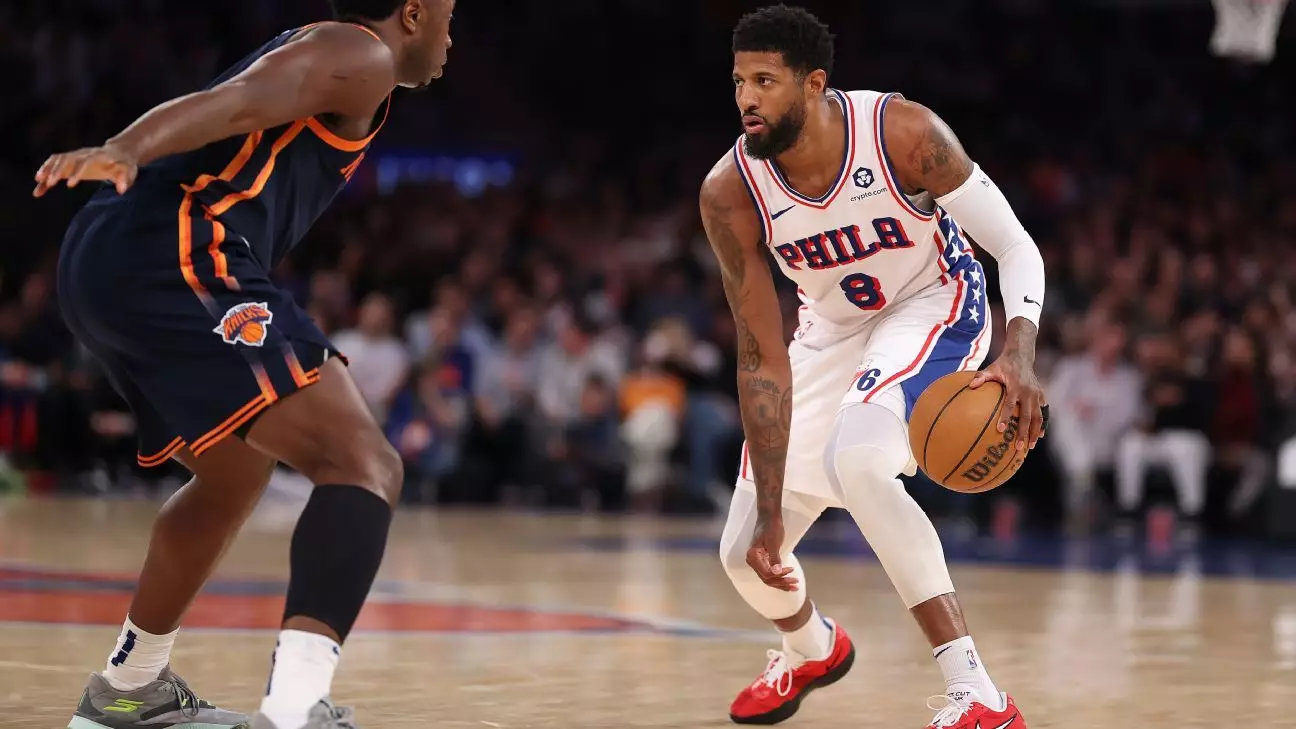The Philadelphia 76ers find themselves in a precarious position following their ninth consecutive defeat, as they lost to the New York Knicks in a tightly contested match that ended 110-105 at Madison Square Garden. This latest setback not only highlights ongoing struggles but also prompts introspection from star player Paul George, who recently chose to step back from his podcasting pursuits to dedicate himself fully to the team’s recovery process.
Paul George’s decision to cease the production of his podcast stems from his desire to focus on helping the 76ers recommit to their goals. With 25 points, 8 rebounds, and 7 assists in a demanding 42-minute effort against the Knicks, George showcased resilience even as the team faced significant challenges throughout the season. “I haven’t been the healthiest,” he admitted, underscoring the personal toll injuries have taken on his performance. The need for self-care has become paramount, alongside the necessity to develop strong teamwork and consistency on the court.
The 76ers’ performance on Wednesday night, while still resulting in a loss, marked a noticeable improvement from their prior game against the Chicago Bulls, where they suffered an unprecedented defeat by 50 points. It was a mismatch that vividly illustrated the team’s current issues, and following that loss, George had expressed concerns regarding the overall competitive spirit of the squad. “We just don’t have the habits a champion or playoff-contending team would have,” he mentioned, implying that the 76ers’ focus and dedication would require substantial enhancement to avoid complete despair.
Despite the ongoing losing streak that has stretched beyond three weeks, the 76ers are not merely resigned to their fate. George emphasized the importance of taking it “one game at a time,” underscoring a determined approach to recovery. The willingness to regroup and refocus speaks to a potentially transformative mindset among the players as they continue to work through their unique challenges.
A significant component of the team’s struggles revolves around the injury status of their key players. Joel Embiid, who has been sidelined for multiple games, remains under medical evaluation for issues concerning his left knee. With uncertainty clouding the potential return of their superstar, the 76ers’ aspirations for a successful season seem increasingly at risk.
Tyrese Maxey, another cornerstone of the team’s ambitions, is also grappling with a right finger injury sustained in a previous game. Although he managed to score 30 points against the Knicks, his shooting performance illustrates the impact of injury on his gameplay, specifically as he struggled from the three-point line. The absence of both Embiid and an entirely healthy Maxey makes it increasingly difficult for George and the rest of the team to forge a competitive identity.
As the 76ers face the prospect of a challenging season, the looming specter of the NBA draft lottery adds another layer of complexity. Currently occupying the sixth spot in the draft standings and trailing the Bulls for a potential play-in position, the outcome of the upcoming games carries significant implications for the franchise’s future. Should the draft pick land within the top six, the organization retains it—a condition stemming from a prior trade with the Oklahoma City Thunder. Conversely, should they fall lower, the pick will be surrendered.
This uncertainty shapes the team’s current strategies as they attempt to regain competitive form while simultaneously considering the broader implications for their roster. With injury struggles and a losing streak that continues to stretch, the focus may shift increasingly toward future prospects while trying to balance present demands.
As the season advances, the challenges facing the Philadelphia 76ers serve as a litmus test for the collective resilience of the players and coaching staff. Paul George’s commitment to refocusing on team dynamics highlights the need for a united effort, especially in the face of adversity. The 76ers have a long road ahead, fraught with challenges, transformations, and potential opportunities for growth. However, it remains imperative that they harness their collective strengths and modularize their efforts to overcome adversity if they hope to redirect their trajectory towards a more promising future.

